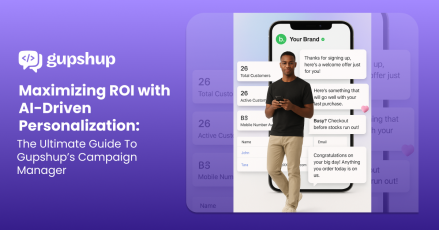How AI Agents Are Transforming Customer Engagement Across Industries

Customers today are becoming increasingly hard to please. Two-thirds of millennials demand real-time customer service, and three-quarters of all customers expect consistent experiences across every channel they interact with. As service expectations rise, so too do cost pressures, making traditional methods like hiring more well-trained employees an unsustainable solution. Now, imagine a world where every customer query is addressed instantly, where businesses anticipate your needs before you even voice them, and where engagement feels personal despite the scale.
This isn’t a vision of the distant future—it’s the present, powered by AI agents. As the linchpin of modern customer interactions, these agents are redefining the essence of customer engagement across industries. They combine intelligence, speed, and personalization to deliver experiences that resonate with customers in ways previously unimaginable.
With AI agents, businesses are no longer just meeting expectations—they’re exceeding them, creating a paradigm shift in how companies build lasting relationships with their customers.
Companies are turning to AI to deliver the proactive, personalized service that customers want, precisely when and how they want it—sometimes even before they realize they need it. For forward-thinking organizations, AI-enabled customer service not only meets these expectations but also opens doors to greater customer engagement. This approach results in increased cross-sell and upsell opportunities while simultaneously reducing cost-to-serve. With AI agent assist solutions, businesses are setting a new standard for engagement that aligns with the demands of today’s digitally-savvy customers.
Understanding the Structure of AI Agents

At the heart of this transformation lies the architecture of AI agents. These advanced systems are not mere tools—they are dynamic frameworks designed to emulate human-like interactions with an unmatched level of precision. Let’s delve deeper into their key components:
1. Natural Language Processing (NLP):
NLP is the backbone of AI agents, enabling them to understand and process human language in context. By analyzing grammar, sentiment, and intent, NLP ensures that these agents can respond accurately to diverse customer queries. For instance, whether a customer says, “Where’s my order?” or “Can you track my package?” the AI agent recognizes the intent as a request for tracking details.
2. Machine Learning (ML):
Machine Learning enables AI agents to improve over time by learning from customer interactions. By analyzing patterns in data, ML helps these agents refine their responses, predict customer needs, and offer solutions even before queries are raised. For example, if customers frequently ask about return policies after viewing certain products, the AI can proactively offer this information.
3. Conversational AI Frameworks:
These frameworks create the “mind” of AI agents, equipping them with the ability to hold human-like conversations. Conversational AI frameworks use advanced algorithms to manage dialogue flow, ensuring that interactions feel natural and intuitive. They also allow for context retention, so customers don’t need to repeat themselves when switching topics.
4. Omnichannel Integration:
Modern customers expect seamless experiences across all touchpoints. AI agents achieve this by integrating with multiple communication channels, such as WhatsApp, SMS, email, and social media platforms. This ensures that regardless of where a customer initiates contact, they receive consistent support and information.
5. Knowledge Base Integration:
AI agents draw on extensive knowledge bases to provide accurate and detailed responses. These knowledge bases include FAQs, product catalogs, and company policies, which are continually updated to reflect the latest information. This allows them to address complex queries quickly and efficiently.
6. Real-Time Analytics:
Real-time analytics empower AI agents to monitor and assess ongoing interactions. By analyzing sentiment and engagement levels, AI agents can adapt their tone and responses to suit the customer’s mood and expectations. For example, a frustrated customer might receive empathetic responses designed to de-escalate the situation.
7. Proactive Capabilities:
One of the standout features of AI agents is their ability to anticipate customer needs. By leveraging historical data and predictive analytics, these agents can send proactive notifications, such as reminders for bill payments or suggestions for complementary products, enhancing the overall customer experience.
This robust structure ensures that AI agents not only respond to customer needs but also anticipate and exceed expectations, setting the stage for a new era of proactive and personalized customer engagement.
AI Agents Across Industries: A Revolution in Customer Engagement
1. Retail and E-commerce
In a sector i.e. retail and E-commerce where personalization is paramount, AI agents are becoming indispensable. They create immersive shopping experiences by:
- Recommending products tailored to individual preferences and browsing histories.
- Instantly addressing questions about availability, shipping, or returns.
- Delivering timely notifications about promotions and restocks.
For instance, an AI-driven customer engagement platform can analyze customer behavior to curate unique shopping journeys, turning casual browsers into loyal customers.
2. Banking and Financial Services
Trust and efficiency are the cornerstones of the BFSI, and AI agents are enhancing both. These digital assistants:
- Simplify complex processes like loan eligibility checks or credit score updates.
- Provide instant support for routine tasks such as balance inquiries or transaction histories.
- Educate customers about financial products through conversational tutorials.
With AI agent assist, banks can elevate their customer support by blending automation with human expertise, ensuring every interaction is efficient and reassuring.
3. Healthcare
In healthcare, where timely communication can save lives, AI agents are making a profound impact. They assist by:
- Streamlining appointment scheduling and providing reminders.
- Pre-screening symptoms and directing patients to appropriate care pathways.
- Offering real-time access to health records and treatment FAQs.
These capabilities not only reduce administrative burdens but also empower patients with accessible, reliable support tailored to their needs.

4. Travel and Hospitality
In the travel and hospitality sector, from booking to boarding, AI agents are redefining how travelers experience their journeys. They enhance service delivery by:
- Offering 24/7 multilingual support for itinerary changes or cancellations.
- Sharing real-time updates on flights, accommodations, or weather conditions.
- Recommending personalized activities, dining options, or travel routes.
With AI-powered solutions, travel companies can provide frictionless experiences, ensuring that every trip is memorable for the right reasons.
5. Education and E-learning
In education, these agents are emerging as indispensable tools for fostering personalized learning experiences. They:
- Act as virtual tutors, providing real-time feedback on assignments and assessments.
- Answer student queries instantly, from administrative issues to subject-specific doubts.
- Enable adaptive learning by analyzing performance data and tailoring educational content.
Such innovations ensure students stay engaged and motivated, while educators save time for more complex teaching responsibilities.

6. Logistics and Supply Chain
AI agents are streamlining operations in the logistics industry by:
- Offering real-time tracking updates for shipments.
- Automating responses to common inquiries, such as estimated delivery times.
- Managing supply chain disruptions proactively by identifying potential bottlenecks and suggesting alternative routes.
By enhancing transparency and efficiency, these agents contribute to a smoother logistics experience for both businesses and customers.
7. Entertainment and Media
AI agents are reshaping the way consumers interact with media and entertainment platforms by:
- Recommending personalized content based on viewing or listening preferences.
- Assisting users with account management, from subscriptions to technical support.
- Delivering notifications about new releases, ensuring users never miss updates on their favorite shows or artists.
These tailored experiences keep users engaged, driving loyalty and retention on media platforms.

Crafting a Next-Level Customer Engagement Strategy
The modern customer engagement strategy revolves around delivering value at every touchpoint, and AI agents are the ultimate enablers of this vision. With solutions like those offered by Gupshup, businesses can:
- Understand Customer Intent: AI agents decode the nuances of customer communication to deliver precise, context-aware responses.
- Automate Routine Interactions: By handling repetitive queries, AI agents free human representatives to focus on more complex issues.
- Drive Personalization: Advanced analytics enable AI agents to customize interactions, making every conversation feel uniquely relevant.
- Scale Seamlessly: Whether addressing a handful of customers or thousands, AI agents ensure consistent quality and responsiveness.
These strategies empower businesses to not only meet the demands of today’s customers but to anticipate the needs of tomorrow’s.
The Road Ahead: AI Agents in the Future of Customer Engagement
The potential of AI agents in redefining customer engagement+industry is boundless. Emerging trends include:
- Hyper-Personalization: Leveraging real-time data to predict customer needs and deliver tailored solutions.
- Emotional Intelligence: Enhancing AI systems to recognize and respond to customer emotions for empathetic interactions.
- Proactive Engagement: Anticipating customer actions and initiating helpful interactions before the customer even asks to promote customer engagement.
- IoT Integration: Collaborating with connected devices to offer comprehensive, intelligent support.
Conclusion
AI agents are not just transforming the way businesses interact with customers; they are shaping the future of customer engagement itself. By adopting AI-powered customer engagement platforms like those offered by Gupshup, companies can unlock unprecedented levels of efficiency, personalization, and satisfaction.
As industries embrace this AI-driven revolution, the question isn’t whether to adopt AI agents but how soon. With Gupshup as your partner, the path to delivering extraordinary customer experiences is clearer than ever. Contact us today and redefine what’s possible in customer engagement.
FAQ’s
1. What is an AI agent, and how does it assist in customer engagement?
An AI agent is a software program powered by artificial intelligence that interacts with customers, answers queries, and provides support. AI agents enhance customer engagement by offering real-time assistance, personalized recommendations, and seamless omnichannel communication.
2. How do AI agents improve customer service efficiency?
AI agents automate repetitive tasks, provide instant responses, and reduce the workload on human agents. This leads to faster query resolution, reduced wait times, and an overall improvement in customer satisfaction.
3. Can AI agents handle complex customer queries?
Yes, AI agents leverage Natural Language Processing (NLP) and Machine Learning (ML) to understand context, intent, and sentiment. While they can handle many complex queries, they also escalate cases to human agents when needed.
4. What industries benefit the most from AI-powered customer engagement?
AI agents are transforming industries such as retail, banking, healthcare, travel, education, logistics, and entertainment. They improve personalization, automate responses, and enhance the overall customer experience in each of these sectors.
Here are some insightful resources to help you to take your business online with AI Agent and enhance customer engagement:
- 10 Powerful AI Agent Use Cases Transforming Retail & E-Commerce
- Transform E-Commerce with Gupshup’s AI Agents
- Calculating ROI with AI Agents: Maximize Efficiency & Growth
- What Are AI Agents? Exploring Their Role in Marketing, Commerce, and Support
- From “There’s an App for That” to “There’s an AI Agent for That”




